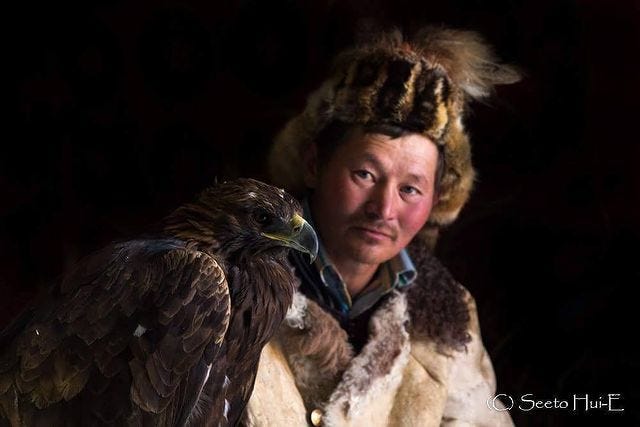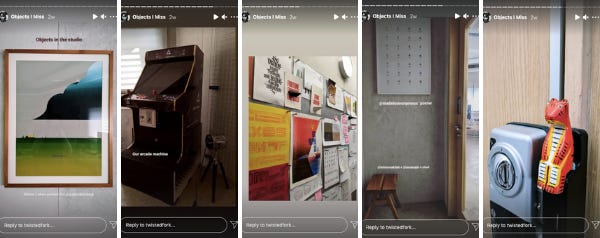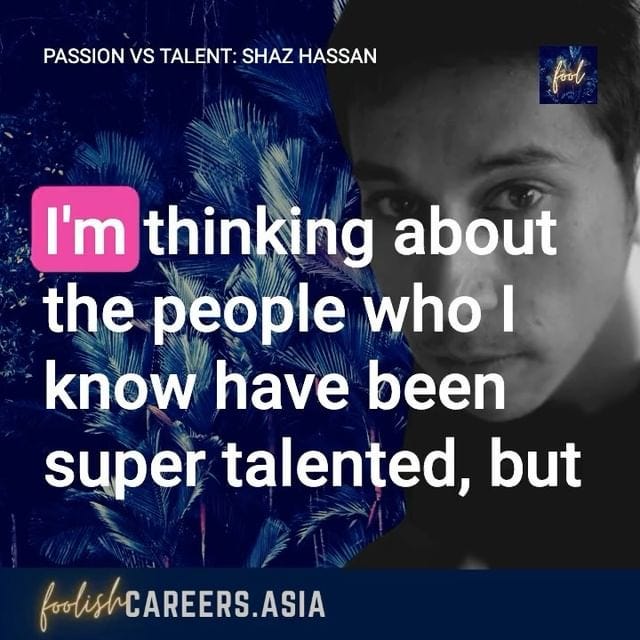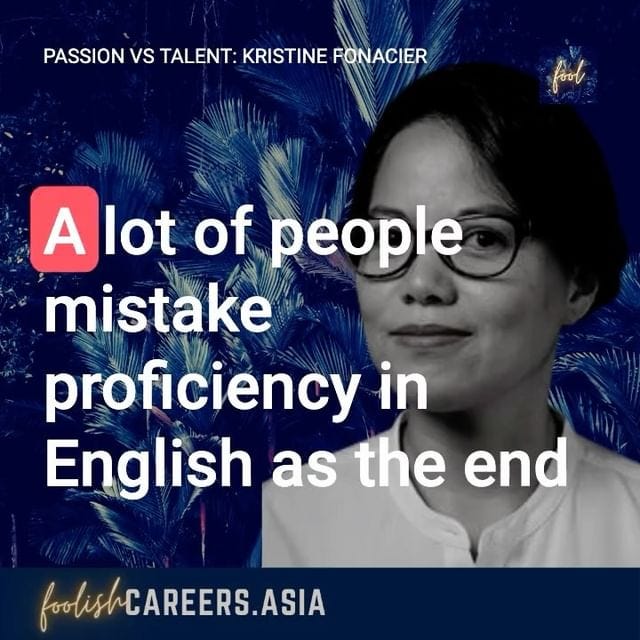Passion or Talent? Here’s what you said - Issue #00005
Plus audiograms!
Have you ever been told: “You should get a more sensible career"? I’m Timi, and each week, we interview a storyteller, artist or creative entrepreneur in Asia who ignored this advice to pursue a creative career. They show us how they paved their own path and dealt with unmitigated failures on their way to building a unique and singular foolish career.
The goal with each story: zero generic fluff!
If you’re not yet a subscriber, you have great timing! This is only Issue #5 and I’d love for you to be an early reader. Sign up, it’s free and takes a minute.👇
Passion or talent?
At the end of every interview, we ask this question: In a creative career like yours, what matters more, talent or passion?
We received specific, thoughtful comments from many of you: writers, artists, commercial creatives. Zero generic fluff!
My favorite response is from Gerald Lu. He chose a career as a sommelier in Singapore before the industry was developed, and had to teach himself using Wine For Dummies. Read on!
Do you choose talent or passion in your own career? Share your view in this thread.
ⓕⓞⓞⓛ
Hui-E Seeto is a senior marketer at Adobe. She has a long-running photography practice focused on adventure travel and nature.
When I hire, the baseline 'talent' is more or less there — if your recruiter has screened candidates properly! What tips the balance when I have to decide between candidates is always about passion. Or, in my parlance, fire in the belly. It's that hunger that will help them overcome obstacles, and it can't be taught.
ⓕⓞⓞⓛ
Lyra Garcellano is a visual artist doing installation work, paintings and comic strips.
I learned to view the idea of passion as a form of internal fuel — the gasoline to keep our engine moving. Without it, we stop way before we even reach longevity in whatever field we find ourselves in. Talent is a tricky word. Its definition is always in relation to someone else declaring it. Who is to say one has talent? There are special skills involved in the mention of talent but the exceptionality of the so-called skills are subject to certain constructs.
So yeah...the question is complex.
Both matter — the fuel to be able to keep on chugging, even if the tools required in the field are constantly being redefined.
ⓕⓞⓞⓛ
Xiao’an Li is a composer and partner at Li & Ortega, an audio production studio for the gaming industry. His tagline on LinkedIn is “music for whatever the hell you want.”
I don't feel like I'm the most passionate person, but I do feel that I'm able to create better work than people who consider themselves passionate about the job. That’s an obvious disconnect: that the level of passion is not necessarily related to the quality of the work.
And being able to do the work without assigning too much of their personal value to it. Because if I'm working on something and someone says, “I don't like that, I want this instead of that,” just put it in. Who cares? It's not mine. So just do it.
Can you imagine the carpenter that made chairs... If you said, "I want a three-legged stool," and he says "Gasp, that's not even a chair.” Who wants to work with that guy?
ⓕⓞⓞⓛ
Budjette Tan is co-creator of the Trese comic books and creative director at LEGO.
He says collaboration beats talent any day. Listen to the audiogram on our Insta (and give us a ❤️)
Go to Budjette’s interview: Writing a Netflix-worthy comic book on your coffee break
ⓕⓞⓞⓛ
Tony Samson is Chairman and CEO of Touch XDA, an experience design agency. Many more people know him as a writer. He’s been writing for 50+ years and has published four books based on his long-running newspaper columns.
Talent drives passion. As then passion expands and deepens talent. The two sink and swim together.
As someone who has achieved longevity, what can you tell those of us who are midway in our careers?
Don’t recycle your past successes. Work should always be a new challenge. Try new clients who haven’t heard of your awards.
ⓕⓞⓞⓛ
Lisa Wallin is senior editor at the Tokyo Weekender and a travel consultant for local government and businesses in Japan.
I think talent is important but without the drive (or passion) to continuously improve, then a person will seldom excel. I strongly believe that it's the passion that will get you where you need to be — talent may help you get your foot in the door, but it's not enough on its own.
And thank you, Lisa, for looping Foolish Careers into this conversation about expanding a career beyond your current specialty, initiated by another Japan-based travel writer Rob Goss. (Welcome, Rob!)
Several experienced writers shared how they did it. It’s a useful thread to understand the importance of having a niche and the investment in time and resources needed for such a pivot.
ⓕⓞⓞⓛ
Dan Matutina is an award-winning designer and editorial illustrator whose work has appeared in Wired, Fast Company and The Wall Street Journal. He is the founder of Plus63 and partner at Hydra Design Group.
When he was starting out, Dan says “I didn’t have the skill to match my passion.”
At that time, I was very passionate about design and illustration, but even if I was very passionate about it I didn't have the necessary skills to produce and execute things that I wanted to do or imagined. Passion is a good fuel. But fuel just makes a machine move, you still need to be able to control it. Even at this stage of my career, I don't think we always overcome that. There are always new skills and new knowledge to learn.
Enjoy this mini virtual studio tour on Dan’s Instagram, entitled Objects I Miss.
ⓕⓞⓞⓛ
Wayne Ree is the author of the short story collection Tales From A Tiny Room and co-creator of the narrative podcast Ghost Maps. As an advertising copywriter, he went freelance a year ago because “I wanted to work on projects I believed in, or at least collaborators whose work I admire.” He explains why he’s able to be picky in this thread.
Not only do I think passion is more important, but I personally don't even like the amount of value placed on talent! Talent, even baseline talent, implies that a natural aptitude towards something is important, when what's really important is how you nurture that talent.
Nurturing works for someone without an innate ability too. Sure, maybe it'll take longer and more practice, but that lack of talent doesn't disqualify someone from being good at something. Placing an importance on talent tends to overshadow that hard work that someone has to put in to get good—and, in creative endeavours, hard work is almost always fuelled by passion.
Wayne has a new project, the comic book Work-Life Balance in collaboration with Benjamin Chee, where they ask the question: “How do the supernatural cope with the super mundane daily grind?” It will be published by Difference Engine in 2022. Congrats, Wayne!
ⓕⓞⓞⓛ
Shaz Hassan is an independent filmmaker and co-author of the Stickerbomb series.
Shaz weighs in at 60-40. Listen to his response on our Instagram👇🏽
Go to Shaz’s interview: Every creator needs a scene
ⓕⓞⓞⓛ
Kristine Fonacier is a writer, editor and entrepreneur.
“A lot of people mistake proficiency in English as the end all and be all of writing talent. It is not.” She explains here:
Go to Kristine’s interview: Giving up rock-and-roll journalism to recalibrate a writing career
ⓕⓞⓞⓛ
Gerald Lu is a sommelier and current chair of the Sommelier Association of Singapore.
In a Singaporean context: The talent pool got no pool, bro. There's very little people to benchmark yourself to. And you don't even know how to benchmark. So I always say at the start, talent is not important.
I started off at $1,250 and my friends were starting out at $2,800 in a junior level position at a bank. And here you are grinding like crazy. I'm not saying my friends don't grind like crazy, they also grind like crazy, but at least they got money to spend on the weekends.
So definitely, definitely, without a shadow of a doubt for me, passion. Not just because you like the product, but because you have so many bad days, and so many moments that you will feel, why the hell do I put myself through this?
That's where the passion part kicks in. Because I love this thing. I wake up because I want to, not because I have to. And then as you go on, you realize, maybe you have some talent, maybe, maybe. Yeah, actually I'm able to pick out flavors quite quickly. Not bad, I can memorize things quite well. I think customers seem to enjoy what I pick.
We’re featuring Gerald in an upcoming issue of Foolish Careers. If you haven’t yet, subscribe here to get every issue, free.
Talent or passion: which matters more to you? Add your view to this thread.
Further reading for fellow nerds: The Practice by Seth Godin
Seth Godin has been my Yoda since he wrote Permission Marketing in 1999. Last year he wrote The Practice to help artists, writers and entrepreneurs commit to putting their best work out into the world. “Creative work doesn’t come with a guarantee, but there is a pattern to who succeeds and who doesn’t. And engaging in the constant practice of its pursuit is the best way forward.”
Seth says this about passion:
Once you decide to trust your self, you will have found your passion. You’re not born with it, and you don’t have just one passion. It’s not domain-specific: it’s a choice.
Our passion is simply the work we’ve trusted ourselves to do.
This is worth deconstructing, because the strategy of “seeking your calling” gives you a marvelous place to hide.
After all, who wants to do difficult work that doesn’t fulfill us? Who wants to commit to a journey before we know it’s what we were meant to do?
The trap is this: only after we do the difficult work does it become our calling. Only after we trust the process does it become our passion.
“Do what you love” is for amateurs.
“Love what you do” is the mantra for professionals.
What did you think of this issue?









